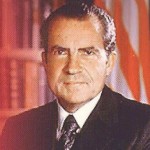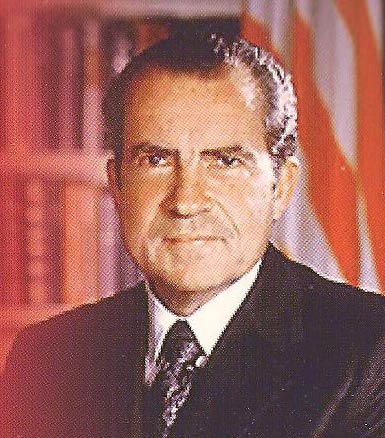
President Nixon, The Man
When Richard Nixon was born in Yorba Linda on January 9, 1913 in the small home which his father built, the area was still a small California farming community outside of Los Angeles. Enduring the many hardships of his childhood and early life, Nixon became the embodiment of the American Dream and earned his place as a charter member of the Greatest Generation. Over time, Nixon would weather the ups and downs of his tumultuous life and in the end he would become the quintessential survivor. Nixon worked hard to get through Whittier College and won a scholarship to study law at Duke University in Durham, North Carolina. After the attack on Pearl Harbor, Nixon enlisted in the military and served his country as a Lieutenant Commander in the U.S. Navy during World War II. Stationed on the remote island of Bougainville in the South Pacific, Nixon would have plenty of time to think about what he wanted to do with the rest of his life. In 1940 he married his college sweetheart, Thelma (Pat) Ryan, cementing a relationship based on love and teamwork that would last a lifetime. Dick and Pat had two beautiful daughters, Tricia and Julie, and together they would one day grace the White House as the First Family.
In what could be described as a meteoric rise to power, Nixon was elected to the House of Representatives in 1946, the U.S. Senate in 1950 and as Vice President of the United States in 1952. The bumpy ride during these rigorous campaigns makes fascinating reading and set the tone for the rest of Nixon’s political career. Early in his public life, Nixon stood out as a staunch anti-communist, garnering significant attention from the press through his investigative involvement in episodes such as the Alger Hiss case. Although he gets little credit, Nixon laid the groundwork for the eventual collapse of the Soviet Union, the liberation of Eastern Europe and the ‘capitalization’ of the Peoples Republic of China, all of which would come to fruition after his presidency. Unlike most vice presidents, Nixon played a significant role as Dwight Eisenhower’s second in command and it was almost a given that he would be the Republican Party’s choice in the 1960 Presidential election. In the end, the country chose a young, attractive, albeit inexperienced John Kennedy rather than the pragmatic, tested statesman, but only by a razor thin margin. Nixon graciously conceded despite the many questions raised about voting irregularities, rather than put the country through the uncertainty of a recount. A 1962 run for the Governorship of California also ended in defeat.
The Presidency
After a six year hiatus from the public arena, Nixon was back in 1968. In the interim he had polished his resume and broadened his international credentials, all the while practicing law in New York. Republicans basked in the glory of his stunning victory over Hubert Humphrey that year, but by the time the Nixons moved into the White House in 1969 the country was already in turmoil. Anti-war sentiment was being fomented by left-wingers who owned the college campuses and the fire was further stoked by the media at a time when there was no cable television to counter their liberal bias. If that wasn’t enough, the President had to deal with a radically left wing House and Senate. Against these odds, it is amazing that the Nixon Presidency accomplished so much and had an impact in so many areas, including the environment, the War on Drugs, civil rights, education and the Space Program, to name a few. It is interesting to speculate how different things would have been if President Nixon had been able to finish his second term. His 1971 War on Cancer initiative comes to mind.
Nixon’s landslide re-election in 1972, winning 49 of 50 states, was just too much for his detractors. When a handful of ruffians broke into Democratic Headquarters at the Watergate Hotel in 1972, the liberals seized on this amateurish prank as a way to neutralize him. A series of gaffs early in the investigation and his betrayal by several key advisors eventually put the presidency in a tailspin. For the next two years the liberal news commentators on all three networks pounded him night after night, eventually influencing public opinion, until President Nixon graciously stepped down on August 8, 1974 to spare the country further division. At that time, President Nixon still had millions of committed supporters, many of whom wept as they watched his resignation speech on television. It was indeed a sad day for the country and a sad day for the world. A few months after President Nixon’s departure, the communists, who had been on the verge of defeat, declared victory in Vietnam, unleashing the killing fields that cost millions their lives. The resignation was a particularly bitter pill to swallow for those who knew President Nixon well, not just because we knew he did not deserve this, but because we knew that he was not a quitter. But President Nixon had much more work to do.
The Legacy
President Nixon will be remembered by most for the historic trip he made to Communist China to meet with Mao Zedong in 1972, opening the world’s most populous country to the rest of the world. To this day, Nixon is revered in China and other countries across the globe for his efforts to bring peace to the world. President Nixon wrote a total of ten books, all well received and widely read. Most were written after his presidency and serve as a foreign policy blueprint for future statesmen to follow. In 1994, he established the Nixon Center in Washington, D.C., an institution which now makes significant contributions to shaping U.S. foreign policy. The Center publishes The National Interest, a journal dedicated to international affairs and diplomacy.
In 1990, he dedicated the Richard Nixon Library and Birthplace in Yorba Linda, featuring the home where he was born, the presidential limousine and helicopter, and a reproduction of the Oval Office, not to mention an unprecedented archive of presidential papers and other historic documents. The Library hosts numerous events featuring world class speakers and public figures and is considered to be one of the best, if not the best, Presidential Library in the country. Both President and Mrs. Nixon are buried in simple graves on the grounds of the library, in keeping with their humble beginnings and the manner in which they conducted their lives. On the occasion of President Nixon’s 98th birthday, we are proud to honor him and thankful for one of the greatest presidents in the history of the United States. Richard Nixon is truly a great American and an inspiration to all.


Very inspiring. What a great man. We were lucky to have him as President of the United States. History will be kind to him for all of his accomplishments but we must keep his good deeds in the public eye to make up for all the horrible things the media did and said about him. To this day if anyone says one disparaging thing about him I write them off as uninformed and feel they are very shallow for listening to only one side.
Happy Birthday President Nixon!!!!
Great article! Richard Nixon was indeed one of the greatest U.S. Presidents..